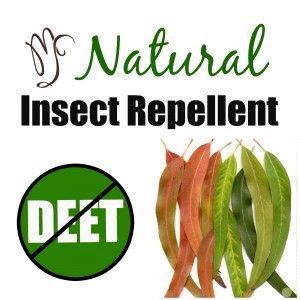Natural Repellent to Keep Pesky Summer Insects at Bay
 Have you ever perused the back of an insect repellent label? If not, you may want to do so. And fast! Chemicals such as DEET and Picaridin can be found in most insect repellents and have been found to be harmful to some adults and children. Below you will find information on the number one ingredient found in insect repellent, DEET, as well as a natural alternative to keep those pesky insects at bay.
Have you ever perused the back of an insect repellent label? If not, you may want to do so. And fast! Chemicals such as DEET and Picaridin can be found in most insect repellents and have been found to be harmful to some adults and children. Below you will find information on the number one ingredient found in insect repellent, DEET, as well as a natural alternative to keep those pesky insects at bay.
 The Low Down on Dirty DEET
The Low Down on Dirty DEET
DEET (N,N-diethyl-m-toluamide), created by the U.S. Army in 1946, poses harmful neurological side effects when used topically and inhaled. As I researched this chemical, I found numerous studies and testimonials regarding the harmful neurotoxic side effects of DEET. Enough to make me want to run the other way when I see it on an ingredient list. One such testimonial came from a woman whose husband suffered from a traumatic brain injury (TBI) and wrote, DEET “sends his tremors and other symptoms off the scale.” She stated that it leaves him debilitated for hours afterward and not just from direct use. Her husband is greatly affected by “surrounding users and the fumes they give off.” Neurotoxic? No thank you!
Natural Alternative to DEET
Our team at Makes Scents Natural Spa Line, as you may already know, is obsessed with anything natural. And keeping insects away naturally is right up there as one of our main concerns. Because our skin is our largest organ, we want to treat it well. Applying products with a ton of chemical additives doesn’t fit into our natural philosophy so we decided to share some of our research with you, our loyal readers, on natural insect repellents.
Oil of Lemon Eucalyptus (OLE)
Oil of Lemon Eucalyptus (OLE) is actually recommended by the Center for Disease Control (CDC) as an alternative to DEET. Huh. What do you know! Several studies have even found OLE to be as effective as DEET in repelling mosquitoes. How does it work you may ask? Well, OLE naturally contains p-Menthane-3,8-diol (PMD). PMD is found in small quantities in the essential oil extracted from the leaves of the lemon eucalyptus tree and, when it is refined, the levels of PMD increase. The higher the PMD level, the better the insect repelling effect. In fact, it is so effective that OLE is the only natural active ingredient permitted to be used an insect repellent in the United States and Europe.
However, there is a big problem. Insect repellents that contain the recommended 30% OLE levels also contain 70% of other unknown ingredients. I am not sure about you, but I like to know everything I am putting on my body, not just 30% of the ingredients. And since OLE is labeled a biochemical pesticide, it is not available for sale to the consumer. However, we feel that using eucalyptus lemon (Eucalyptus citriadora) essential oil that contains some PMD is better slathering on a slew of other unknown chemicals. Even though we can’t replicate the effects of Oil of Lemon Eucalyptus that contains 65% PMD, we can sure try to come close.
Natural Insect Repellent Recipe
Ingredients
25 drops (1/2 tsp) certified 100% pure eucalyptus lemon oil
2 ounces NON-GMO soybean oil (found to be effective in repelling insects)
Directions: Add ingredients and mix well. Best stored in a dark container such as an amber glass bottle. We like to use glass roll-on bottles that are great for on the go.
Application: Apply to skin prior to going outside. Massage into skin until well absorbed. Apply as needed but not more than every two hours.
Now, we would like to hear from you, our amazing readers! What products or essential oils have you found to be effective at keeping pesky summertime bugs away?
CAUTION: Never use 100% pure essential oils on your skin; always use a dilution. As a general rule for skin applications, use no more than a 5% essential oil concentration. Test your repellent on a small area of skin for 24 hours to see if it causes any kind of irritation because of skin allergies or sensitivities to the oils. If irritation occurs, stop use and consult physician if irritation persists. Keep out of reach of children. For external use only. Keep away from your eyes, nostrils and mouth. Oil of Lemon Eucalyptus and lemon eucalyptus essential oil may be poisonous if ingested in high quantities. According to the CDC OLE should not be used on children under 3. This information and DIY recipe is not intended to prevent, treat or cure disease. Use caution, oils may stain fabric and other materials.

No comments yet. Be the first!